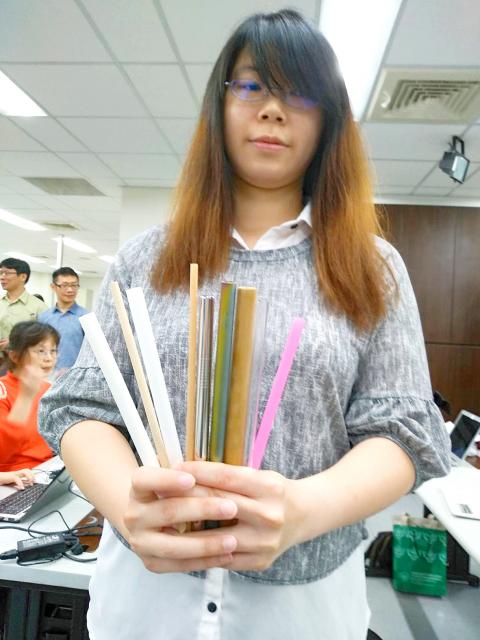A ban on giving single-use plastic straws in about 8,000 venues is to take effect from July, and is expected to reduce the number of plastic straws used by 100 million per year, the Environmental Protection Administration (EPA) said yesterday.
After announcing a draft for the ban on June 8 last year, the agency held several public hearings to gather opinions and revised some of its content.
Starting from July, about 8,000 venues ranging from government agencies, public and private schools, department stores, shopping malls and fast-food chains would be prohibited from offering customers eating at the venues single-use plastic straws, EPA Deputy Minister Shen Chih-hsiu (沈志修) said.

Photo: Liu Li-jen, Taipei Times
Those purchasing takeaways would not be affected for the moment, he said, adding that the agency would evaluate how to limit the use of plastic straws in take-out orders in a year’s time.
Biodegradable straws with an EPA-certified logo and plastic straws attached to beverages during the manufacturing process would not be banned, Shen said.
Also banned are straws made of paper, sugarcane fiber or other eco-friendly materials that contain plastic, even if it accounts for less than 10 percent of their weight, he said.
The agency had not included such straws in the draft, as most paper-made lunchboxes contain a plastic layer for insulation that accounts for less than 10 percent of their weight, Department of Waste Management Director-General Lai Ying-ying (賴瑩瑩) said.
Over the past year, some developers have introduced paper straws without the plastic layer, so the agency considers it possible to ban those that contain plastic, she said.
Biodegradable straws refer to those made from polylactic acid, which decompose more easily than entirely plastic straws, Lai said.
Taiwanese use nearly 3 billion plastic straws per year, department senior technical specialist Lee Yi-hua (李宜樺) said.
From July, venues contravening the regulation would be warned, while repeat offenders would face a fine of NT$1,200 to NT$6,000 under the Waste Disposal Act (廢棄物清理法), he said.
From July next year, offenders would be fined without receiving a warning, he said.
Despite some disagreement about the proposed ban last year, it has triggered new commercial opportunities, as eco-friendlier straws continue to be launched and reusable straws are selling better online, Lee said.
The agency would put up notices on the doors of affected venues to remind consumers of the ban, department technical specialist Teng Pi-shin (鄧丕信) said.
McDonald’s Taiwan has said that it plans to implement its no-straw policy nationwide by the end of next month, and would be introducing a new lid to enable people to sip cold drinks without a straw.

SHIPS, TRAINS AND AUTOMOBILES: The ministry has announced changes to varied transportation industries taking effect soon, with a number of effects for passengers Beginning next month, the post office is canceling signature upon delivery and written inquiry services for international registered small packets in accordance with the new policy of the Universal Postal Union, the Ministry of Transportation and Communications said yesterday. The new policy does not apply to packets that are to be delivered to China, the ministry said. Senders of international registered small packets would receive a NT$10 rebate on postage if the packets are sent from Jan. 1 to March 31, it added. The ministry said that three other policies are also scheduled to take effect next month. International cruise ship operators

NUMBERS IMBALANCE: More than 4 million Taiwanese have visited China this year, while only about half a million Chinese have visited here Beijing has yet to respond to Taiwan’s requests for negotiation over matters related to the recovery of cross-strait tourism, the Tourism Administration said yesterday. Taiwan’s tourism authority issued the statement after Chinese-language daily the China Times reported yesterday that the government’s policy of banning group tours to China does not stop Taiwanese from visiting the country. As of October, more than 4.2 million had traveled to China this year, exceeding last year. Beijing estimated the number of Taiwanese tourists in China could reach 4.5 million this year. By contrast, only 500,000 Chinese tourists are expected in Taiwan, the report said. The report

The Forestry and Nature Conservation Agency yesterday launched a gift box to market honey “certified by a Formosan black bear” in appreciation of a beekeeper’s amicable interaction with a honey-thieving bear. Beekeeper Chih Ming-chen (池明鎮) in January inspected his bee farm in Hualien County’s Jhuosi Township (卓溪) and found that more than 20 beehives had been destroyed and many hives were eaten, with bear droppings and paw prints near the destroyed hives, the agency said. Chih returned to the farm to move the remaining beehives away that evening when he encountered a Formosan black bear only 20m away, the agency said. The bear

HORROR STORIES: One victim recounted not realizing they had been stabbed and seeing people bleeding, while another recalled breaking down in tears after fleeing A man on Friday died after he tried to fight the knife-wielding suspect who went on a stabbing spree near two of Taipei’s busiest metro stations, Taipei Mayor Chiang Wan-an (蔣萬安) said. The 57-year-old man, identified by his family name, Yu (余), encountered the suspect at Exit M7 of Taipei Main Station and immediately tried to stop him, but was fatally wounded and later died, Chiang said, calling the incident “heartbreaking.” Yu’s family would receive at least NT$5 million (US$158,584) in compensation through the Taipei Rapid Transit Corp’s (TRTC) insurance coverage, he said after convening an emergency security response meeting yesterday morning. National